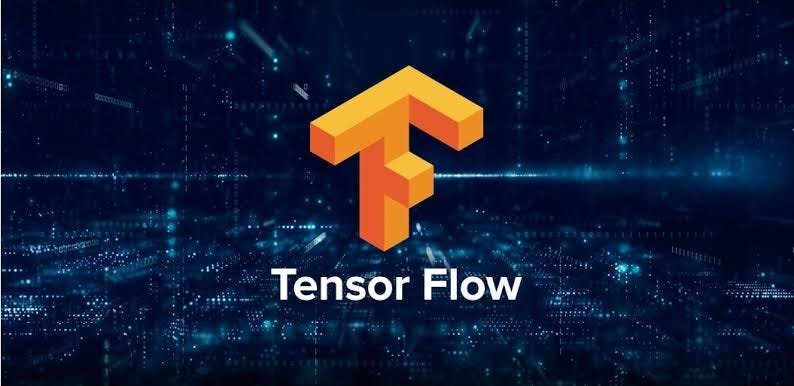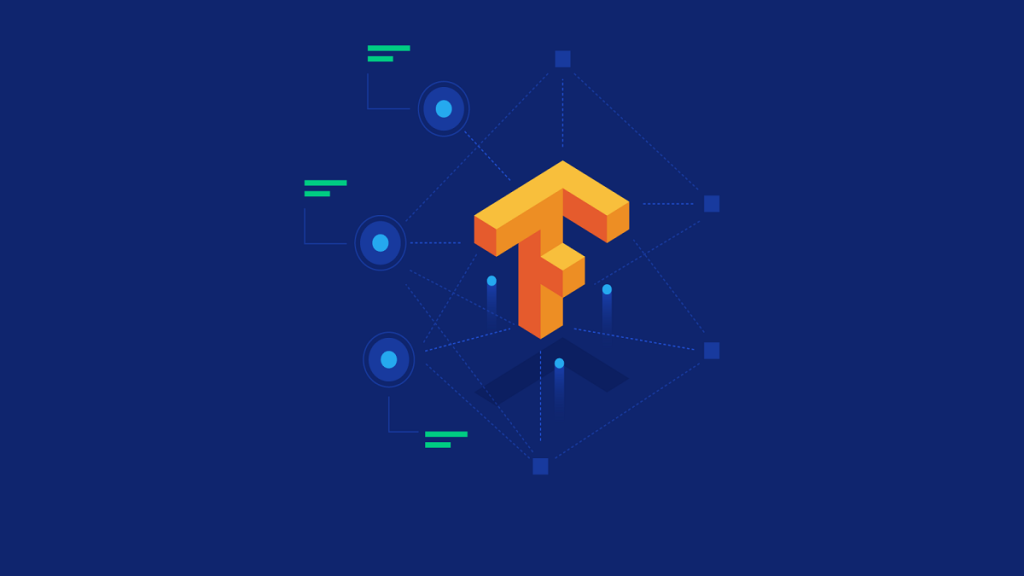Google produced the well-known free and open-source machine learning library TensorFlow. Learning to utilize Tensorflow via classes is the best way to further your career in data science since it is a top framework and a popular option for machine learning and deep learning. It’s also comforting to know that data scientists make, on average, over $110,000 per year, according to the Bureau of Labor and Statistics. This suggests that investing the time to improve your data science knowledge via one of the top TensorFlow Courses may pay off well.
A robust open-source machine learning package is called TensorFlow. It was first developed as an internal tool at Google and was made available to the public in 2015. As artificial intelligence gained traction, it grew in popularity.
TensorFlow’s extensive, adaptable toolkit and community resources make it one of the greatest frameworks for implementing machine learning applications, including deep learning. It enables developers to create and implement ML-powered apps with ease, and researchers to advance the state of the art in machine learning.
Popular TensorFlow Courses

1. Introduction to TensorFlow for Artificial Intelligence, Machine Learning, and Deep Learning
For someone who is brand-new to deep learning (DL) or machine learning (ML) and wants to study TensorFlow, this one of the top TensorFlow Courses can be the top choice. It will assist you in creating scalable, potent AI-powered algorithms for a variety of uses. You must have prior Python expertise and a working knowledge of high-school arithmetic to enroll in this course. It is not necessary to have any previous machine learning knowledge.
A quick overview of deep learning and machine learning is given at the start of the course. Once these bases are covered, you may investigate fascinating situations. For instance, you’ll discover how to use a TensorFlow-implemented single-layer neural network to track, evaluate, and forecast changes in home values.
The course’s following section focuses entirely on computer vision, or teaching computers to “see” and comprehend pictures. To categorize the photos of clothing items in the Fashion MNIST dataset, your objective is to construct a multilayer neural network. To achieve this, you will monitor the accuracy and loss of the model during training, look at how layer size affects the network’s predictions and training time, and use pixel value normalization to expedite the training process.
Provided by: Coursera.
Duration: 17 hours.
Certification: Paid.
2. Intro to Machine Learning with TensorFlow
Numerous studies indicate that this three-month curriculum is intended for students who are proficient in Python and want to explore TensorFlow machine learning models. The course takes you through the fundamentals of machine learning, starting with supervised models and data cleaning and working your way up to deep and unsupervised learning.
You get practical experience by working on projects and exercises using code, such as creating an image classifier or segmenting clients based on unsupervised learning methods. Every assignment pushes you to apply your knowledge to actual situations, such as forecasting contribution yield for a nonprofit or analyzing clientele for a company.
Provided by: Udacity.
Duration: Three months.
Certification: Paid.
3. Getting started with TensorFlow 2
This one of the Best TensorFlow Courses teaches Python programmers who are already proficient in ML and DL how to use TensorFlow to create deep learning models. Using the Sequential API, you will learn how to construct, train, and evaluate models as part of an end-to-end process for creating deep learning models with TensorFlow.
Additionally, you will create deep learning models for a variety of uses, such as sentiment analysis, texts, regression tasks, picture categorization, and generative language models. Following that, you will discover how to set up and maintain TensorFlow 2, as well as how to access and use the TensorFlow documentation as necessary. Additionally, you will learn how to use Google Colab to execute TensorFlow scripts.
Initially, you will investigate the several choices that Keras provides to help with the model-building process. These options include the ability to design and train models using a variety of loss functions and optimizers, as well as alternative approaches to assessing model performance.
Provided by: Coursera.
Duration: 26 hours.
Certification: Paid.
4. Machine Learning Crash Course with TensorFlow APIs
One of the finest resources for studying TensorFlow and machine learning may be Google. This quick introduction to TensorFlow, which includes over 30 practice activities and 25 courses from Google’s seasoned experts, combines academic rigour with practical usefulness.
Our observations indicate that this course covers important machine learning ideas like differentiating machine learning from traditional programming, comprehending gradient descent and loss, assessing the efficacy of models, representing data for machine learning, and building deep neural networks.
In addition to the extensive course material, there is a parallel Kaggle competition where you can put your abilities to use. This offers a great opportunity to combine theory with practice.
Provided by: Google.
Duration: 15 hours.
Certification: Free.
5. Learn TensorFlow and deep learning, without a Ph.D
In case you’re curious about TensorFlow and deep learning, this quick 3-hour course will provide you with all the necessary information. Without a Ph.D., study TensorFlow and deep learning; it stays away from technical jargon and teaches you the essential ideas.
A few fundamental network topologies, including as dense, convolutional, and recurrent networks, as well as training strategies like batch normalization and dropout are the main topics of discussion.
You will have all the information required to thoroughly understand deep learning after the course. There is an introduction to deep learning at the start of the course. You will investigate a simple but well-known use of deep learning: the identification of handwritten numbers. You’ll then discover what components go into making a successful neural network.
One kind of neural network that is excellent for image recognition applications is a convolutional network! You will learn about the operation of convolutional networks and how batch normalization may increase their efficiency in this one of the popular TensorFlow Courses.
Provided by: Google.
Duration: 3 hours.
Certification: Free.
6. Deep Learning with TensorFlow
Learn the fundamentals of TensorFlow in this IBM course, including its primary features, operations, and execution pipeline, and get started developing your deep-learning software! TensorFlow Deep Learning starts by teaching you the basics of machine learning (classification, regression, and curve fitting), and then it applies those principles to the area of deep learning explicitly.
The complexities of deep neural networks and various designs, such as autoencoders, recurrent networks, and convolutional networks, will be thoroughly covered. All you need to enroll in this course is some past Python programming expertise. Following an introduction to the TensorFlow framework and a “Hello World!” tour of machine learning, the course covers several fundamental machine learning techniques, including logistic and linear regression.
CNNs operate by transferring inputs via a series of intricate layers composed of computational neurons, much like the human brain. Before creating a CNN that can read handwritten numbers, you will have to understand precisely what convolutions are.
Provided by: edX.
Duration: 16-20 hours.
Certification: Paid.
7. A Complete Guide on TensorFlow 2.0 using Keras API
This one of the Best TensorFlow Courses incorporates practical projects into the learning process while offering a thorough overview of TensorFlow applications. This implies that you will use Flask to develop a Fashion API and RESTful API to serve the TensorFlow model. Students really like the tests that follow each module, and previous students often comment on how thorough and current the course material is.
This course is divided into five sections. The first covers the fundamentals of the TensorFlow 2.0 library and then moves on to the actual application of various neural network architectures, such as fully connected, convolutional, and recurrent neural networks. The development of a stock market trading bot using Reinforcement Learning—more particularly, a Deep-Q Network—is one notable accomplishment.
Provided by: Udemy.
Duration: 13 hours.
Certification: Paid.
8. Google AI for JavaScript Developers with TensorFlow.js
This TensorFlow course, which is being provided in association with Google, aims to enable web developers to incorporate machine learning and artificial intelligence into their online applications.
The course teaches you how to apply the fundamental ideas of AI, machine learning, and deep learning via practical examples. This one of the famous TensorFlow Courses also stands out, in our opinion, for its practical focus, which pushes you to apply your knowledge to a variety of settings, such as using camera sensors for alarm detection or filtering spam in blog post comments.
Provided by: edX.
Duration: 7 weeks.
Certification: Paid.
How Can You Choose the Best Course for TensorFlow?
When choosing the finest TensorFlow Courses, it’s incredibly useful to evaluate your learning style and goals beforehand. Are you new to TensorFlow and want to learn it? Or are you an experienced practitioner looking for more complex ideas or attempting to decide between TensorFlow and PyTorch?
Which kind of learning environment works best for you—a structured classroom or self-paced online courses? Having concise responses to these questions will help you narrow down your choices. Here are some factors to consider while choosing a course:
Curriculum & Course Content: Students like classes that provide a logical development, beginning with the fundamentals and working their way up to more complex subjects.
Expertise and Reputation of the Instructor: Seek for courses taught by seasoned experts with a strong track record in the industry.
Practical Activities and Projects: We selected courses that provide a wide range of practical exercises, projects, and real-world applications.
Student Evaluations and Stars: To find out how well the courses have been accepted by the students, go through the course ratings and student reviews.
Accreditation or Certification: Select classes that provide officially recognized certificates to boost your reputation in the TensorFlow community.
FAQ
Q: Is it still worthwhile to study TensorFlow?
A: Let’s examine a few justifications for why TensorFlow is an important tool. To begin with, TensorFlow is flexible. Whether you deal with cloud platforms, iOS, Android, CPUs, GPUs, or even embedded devices, TensorFlow fits right in. TensorFlow makes model construction easier, particularly when working with neural networks.
Q: Could ChatGPT be TensorFlow based?
A: To put it briefly, ChatGPT is being developed using many machine learning frameworks. It is mostly written in PyTorch, but it may be modified to function with TensorFlow as well.
Q: Is TensorFlow used by Tesla?
A: Although TensorFlow is a more sophisticated deep learning framework than many others, it is still a very useful tool for creating and training neural networks. Large-scale projects throughout the globe utilize it, including those run by Google, Uber, Airbnb, Tesla, and many more.







